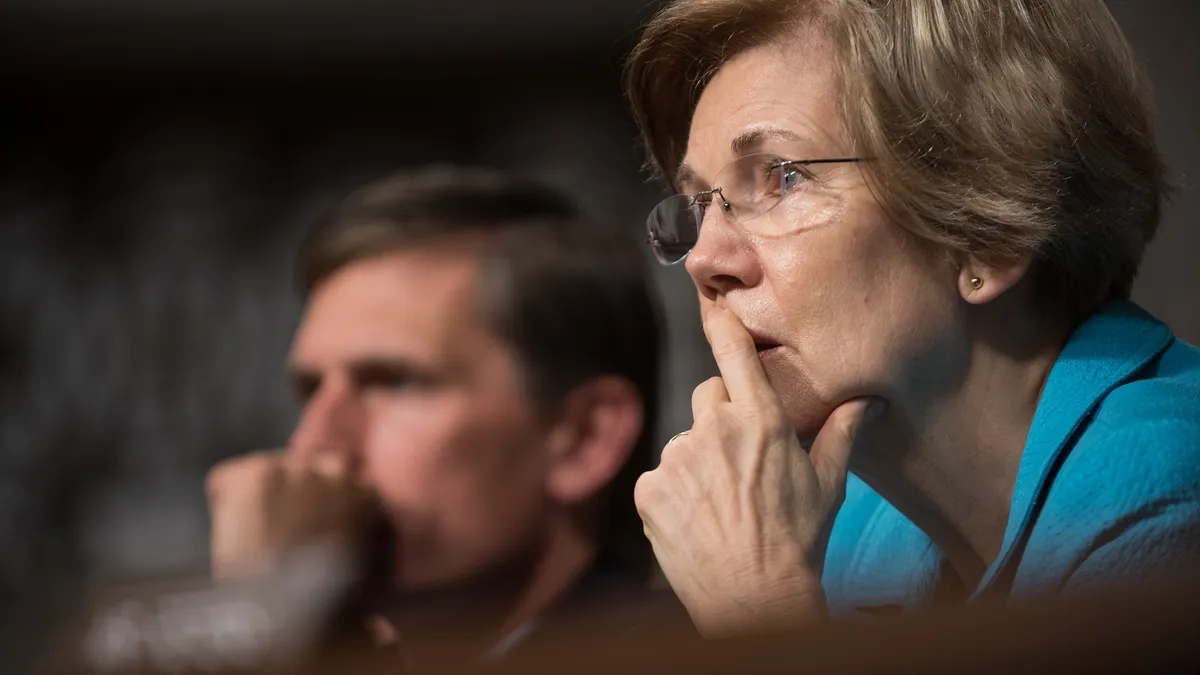Sen. Elizabeth Warren, D-MA, on Tuesday became the highest-profile lawmaker to oppose a second term for Federal Reserve Chair Jerome Powell.
“You have acted to make our banking system less safe, and that makes you a dangerous man to head up the Fed and that is why I will oppose your renomination,” she said during a Senate Banking Committee hearing that was slated to serve as a progress report from Powell and Treasury Secretary Janet Yellen on pandemic recovery efforts through the CARES Act.
“The elephant in the room is whether you’re going to be renominated,” Warren told Powell. “Renominating you means gambling that, for the next five years, a Republican majority at the Federal Reserve, with a Republican chair who has regularly voted to deregulate Wall Street, won’t drive this economy over a financial cliff … So far you’ve been lucky. But the 2008 crash shows what happens when the luck runs out.”
Warren has regularly been an outspoken critic of certain Fed leaders and well-known bank CEOs — and has used Senate hearings to voice her displeasure.
Warren, in a May hearing, asked the Fed’s vice chair for supervision, Randal Quarles, if he regretted removing Credit Suisse and other foreign banks from a Fed committee’s purview months before the Swiss lender took $5.5 billion in losses from the collapse of investment firm Archegos Capital Management.
“Our financial system will be safer when you are gone,” she told Quarles.
Later that week, Warren engaged in a testy exchange in a hearing with JPMorgan Chase CEO Jamie Dimon, in which she called Dimon "the star of the overdraft show" and noted that the bank collected close to $1.5 billion in overdraft fees during the pandemic to that point — a total she said was seven times more per account than its competitors.
"I think your numbers are totally inaccurate," Dimon countered, adding the bank waived fees upon request for customers who were struggling.
Powell’s term as Fed chair expires in February, and President Joe Biden has said he would decide this fall whether he would renominate the central bank chief. But progressive Democrats have sought to push Biden toward a candidate — most prominently, Fed Gov. Lael Brainard — whose take on economic policy skews further left.
“The President will continue to engage with his senior economic team in a careful and thoughtful process to appoint a Federal Reserve chair in a timely manner,” a spokeswoman for the White House told The Wall Street Journal on Tuesday.
Including the Fed chair role, Biden could fill up to four seats on the central bank’s board of governors, according to Bloomberg. Quarles’ term as vice chair expires Oct. 13, though he could serve as a Fed governor through 2032. Vice Chair Richard Clarida’s term expires in January. And there is a vacant seat.
Warren on Tuesday asked Powell whether he regretted three deregulatory actions: a weakening of stress tests for big banks, the weakening of Volcker Rule limits on bank investments, and lower liquidity requirements for banks that have $250 billion to $700 billion in assets.
“Capital in the largest banks is at multidecade highs,” Powell said in response to Warren’s characterization of stress tests.
Warren interjected, according to The Wall Street Journal, that Fed research showed the biggest banks avoided $300 billion in losses because of the government’s broader economic-policy response to the pandemic.
“Which they would have been able to absorb without difficulty,” Powell said, adding that he was willing to review any regulatory changes the Fed made in the past four years.
After the hearing, Warren told Bloomberg the Fed chair “should be like a sentry, standing at the gates, making certain that banks are not loading up on risks that could take down the entire economy.”
Speaking to Powell earlier, Warren drew a parallel to the 2007-08 mortgage crisis.
“I saw it in the 2000s. Over and over, the Fed would just ease back a little as the banks took on some more risk … Up until the markets were starting to crash and, you know, the mortgage market was burning to the ground, the Fed maintained a largely hands-off approach,” she said. “I came to Washington after the 2008 crash to make sure that nothing like that would ever happen again. Your record gives me grave concern.”
Sen. Mike Rounds, R-SD, followed Warren, saying, in contrast, that Powell deserved to be renominated.
If Biden were to nominate a more liberal candidate for Fed chair, he risks alienating more moderate Democrats, such as Sen. Jon Tester of Montana, when their party holds a 50-50 split in the Senate.
In telling The Wall Street Journal this month that he backed Powell, Tester referred to Brainard, saying “[her] time may come.”
“It makes me very, very uneasy if we’re going to appoint somebody to move the Fed and lose its independence,” he said.
Sen. Sherrod Brown, D-OH, has held off on publicly backing Powell, but pushed during Tuesday’s hearing for a more diverse central bank.
Yellen told senior White House advisers last month that she supports reappointing Powell as chair, according to Bloomberg.
The hearing came one day after two of the Fed’s regional bank chiefs — Eric Rosengren and Robert Kaplan — resigned amid news that they traded stocks in 2020 while also helping to set monetary policy. The practice adheres to the Fed’s rules on ethics but has generated concern over potential conflict of interest.
For his part Tuesday, Powell told lawmakers the Fed would alter its ethics rules and is looking into the trading activity to ensure it was legal and compliant.
“Our need to sustain the public’s trust is the essence of our work,” Powell said Tuesday. “We will rise to this moment.”





















